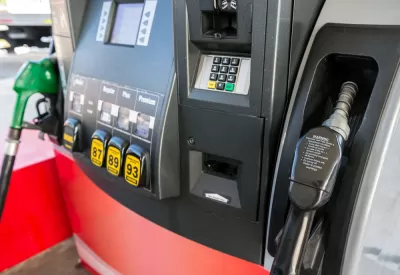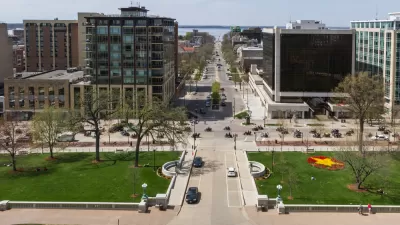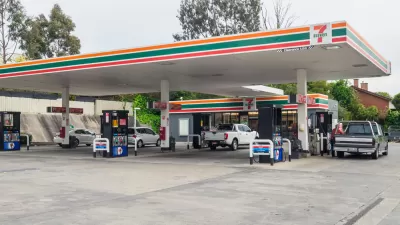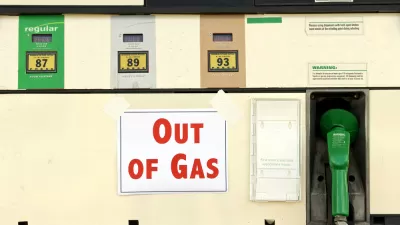Without an automatic adjustment for gas taxes, revenue from the tax declines due to increasing fuel efficiency standards while road maintenance and construction costs increase due to inflation. Witness Wisconsin's woes.

Like most states, Wisconsin relies to a great extent on user fees, particularly the gas tax, to fund its roads. [How does your state pay for its roads?]
But that share has been declining since the legislature abolished the practice of automatically adjusting its gas tax in 2006, now stuck at 32.9 cents per gallon for over 11 years. [When did your state last increase its gas tax?]
Furthermore, it's not only causing transportation headaches for the legislature, it's also holding up the budget process, reports Marti Mikkelson for WUWM (Milwaukee Public Radio–listen here).
“Up until that point, there had been an automatic increase based on several different variables and there was always a little more money coming in. Once you eliminated those automatic increases, then you essentially ended up with a stagnant revenue pool,” Wisconsin Taxpayers Alliance spokesman David Callende says.
Republican Gov. Scott Walker has not been helpful. "When he took office in 2011, he made it clear, that there would be no increases in registration fees -- or gas taxes -- in his budgets," adds Mikkelson.
Unlike some states, like California, where hiking taxes often comes down to a partisan divide, in Wisconsin, a Republican trifecta, an "ideological split between the GOP leaders in the Assembly and Senate complicates the search for answers," according to JR Ross of wispolitics.com.
Two user fees not taken off the table are adding road tolls near the state borders, with the idea of catching out-of-state motorists, and adding a vehicle-miles-traveled fee for heavy trucks, aka weight distance tax, both described here last month.
A proposal to add a sales tax to fuel purchases and reduce the gasoline excise tax posted in May apparently failed.
Wisconsin has plenty of company
According to a June 28 publication by the Institute on Taxation and Economic Policy (ITEP), "thirty states and the federal government levy fixed-rate gas taxes where the tax rate does not change even when the cost of infrastructure materials rises or when drivers transition toward more fuel-efficient vehicles and pay less in gas tax."
However, it's not always easy legislating automatic increases to the gas tax, as Massachusetts lawmakers discovered in 2014.
Hat tip to AASHTO Daily Transportation Update
FULL STORY: Why is Transportation Such a Stickler in The Wisconsin State Budget?

Alabama: Trump Terminates Settlements for Black Communities Harmed By Raw Sewage
Trump deemed the landmark civil rights agreement “illegal DEI and environmental justice policy.”

Study: Maui’s Plan to Convert Vacation Rentals to Long-Term Housing Could Cause Nearly $1 Billion Economic Loss
The plan would reduce visitor accommodation by 25% resulting in 1,900 jobs lost.

Why Should We Subsidize Public Transportation?
Many public transit agencies face financial stress due to rising costs, declining fare revenue, and declining subsidies. Transit advocates must provide a strong business case for increasing public transit funding.

Paris Bike Boom Leads to Steep Drop in Air Pollution
The French city’s air quality has improved dramatically in the past 20 years, coinciding with a growth in cycling.

Why Housing Costs More to Build in California Than in Texas
Hard costs like labor and materials combined with ‘soft’ costs such as permitting make building in the San Francisco Bay Area almost three times as costly as in Texas cities.

San Diego County Sees a Rise in Urban Coyotes
San Diego County experiences a rise in urban coyotes, as sightings become prevalent throughout its urban neighbourhoods and surrounding areas.
Urban Design for Planners 1: Software Tools
This six-course series explores essential urban design concepts using open source software and equips planners with the tools they need to participate fully in the urban design process.
Planning for Universal Design
Learn the tools for implementing Universal Design in planning regulations.
Smith Gee Studio
Alamo Area Metropolitan Planning Organization
City of Santa Clarita
Institute for Housing and Urban Development Studies (IHS)
City of Grandview
Harvard GSD Executive Education
Toledo-Lucas County Plan Commissions
Salt Lake City
NYU Wagner Graduate School of Public Service





























